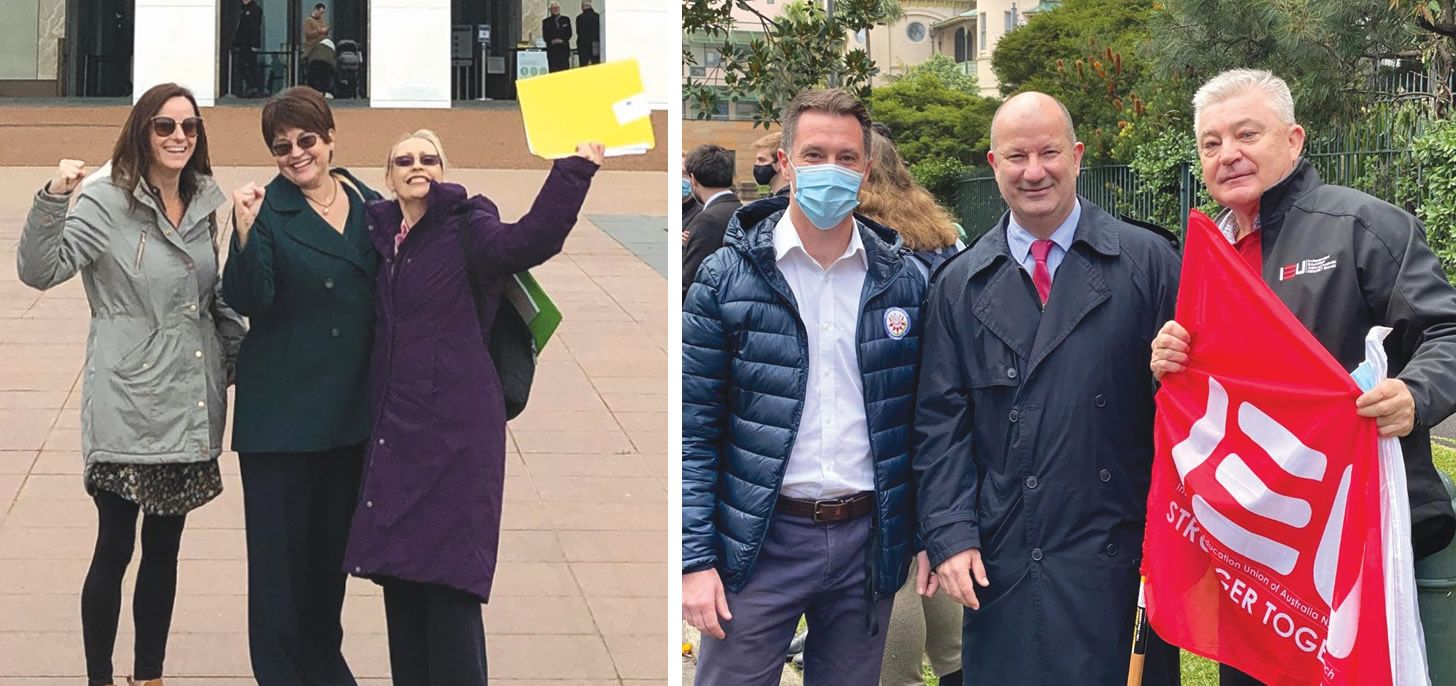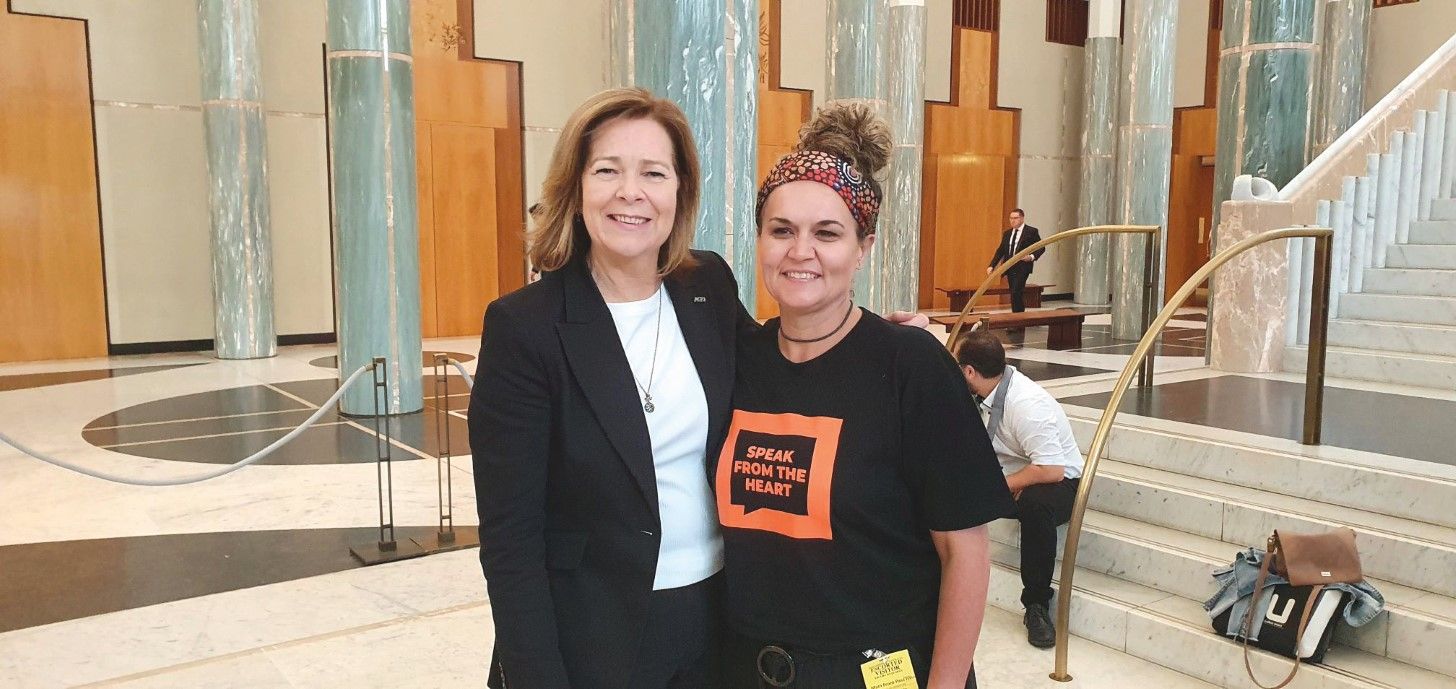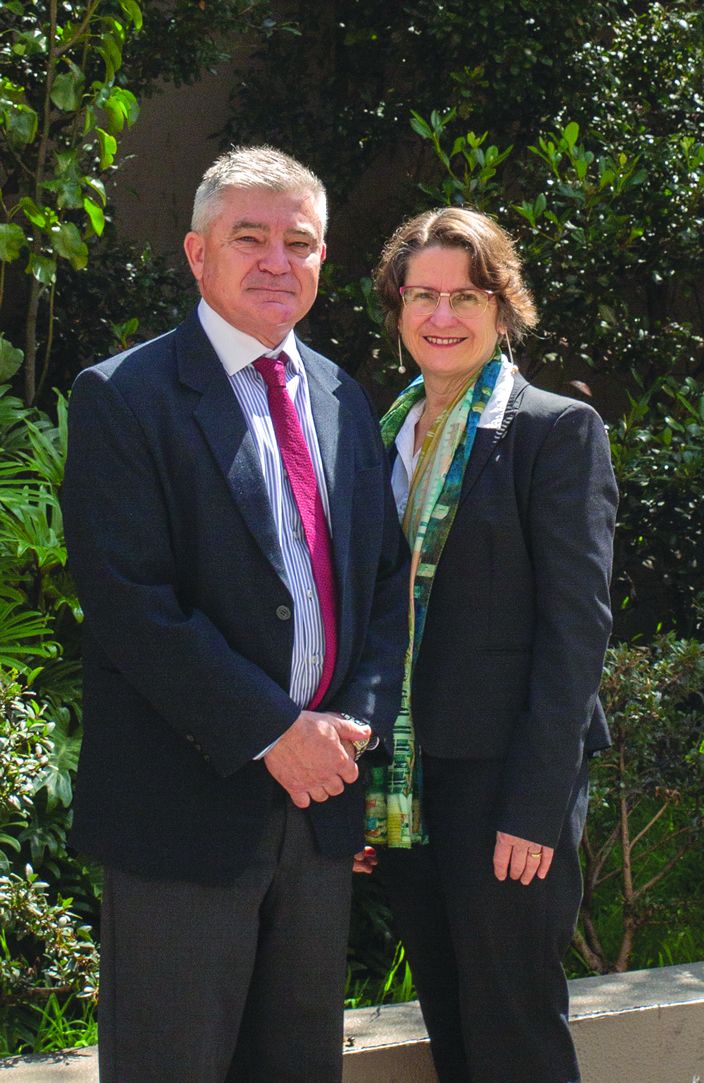“May you live in interesting times”, as the ancient blessing (or is it a curse?) goes. In 2021, IEU members, elected officials, organisers, industrial officers and staff certainly lived in more than their fair share of “interesting times”. In a special four-page extract from the IEU’s 2021 Annual Report, IEUA NSW/ACT Branch Acting Secretary Carol Matthews reflects on the breadth and depth of the union’s work over a year like no other (well, except perhaps for 2020). We’ve included some of the year’s best photos. In an uncertain year, one thing is for sure – it makes for “interesting” reading.
2021 Year in review

Acting Secretary Carol Matthews looks back over a turbulent year in a special four-page excerpt from the union’s 2021 Annual Report.
I am delivering this report on behalf of the Branch Secretary, Mark Northam, who is on leave. The last 12 months have seen unprecedented interruption to daily life in all countries of the world.
Without doubt, Australia has escaped the worst of the pandemic. However, the Delta variant of the COVID virus proved challenging in the second half of 2021, with schools in many parts of NSW effectively closed for nearly four months from late June until late October. ACT schools have also been closed from mid-July until late October. Residents of 12 Sydney Local Government Areas suffered particularly onerous restrictions as the NSW Government struggled to limit transmission of the highly contagious variant. There has been an atmosphere of fear and trepidation only starting to dissipate as vaccination levels have approached 80 percent of the eligible population and the NSW Government launched its roadmap out of lockdown from 11 October.
Virus, vaccination, Public Health Orders and push back
One measure used by the NSW Government to control the spread of the virus has been Public Health Orders (PHOs) requiring employees in particular sectors to be vaccinated against COVID, including health and aged care. A PHO was also made requiring early learning centre and disability staff who lived or worked in one of the 12 LGAs to have had at least one dose of the vaccination or have a medical contraindication certificate. Similar provisions applied to other authorised workers, such as school staff, who had to leave one of the 12 LGAs for work and those workers also required a government permit. Keeping up to date with the changes and understanding who was caught became a full-time occupation.
In late August, the NSW Government dropped a bombshell when it announced its intention to require all school and early learning centre staff to be double vaccinated by 8 November. There was a considerable delay in the making of the PHO causing confusion and doubt as to whether the government would implement its policy and whether a broader range of exemptions would be available than foreshadowed by the government. The union was flooded by complaints about the government policy, including by people who were not members or who had only joined the union shortly before. Finally, a PHO was made on 23 September 2021 in line with the August announcement. A week later a new timetable was announced for the re-opening of schools across Sydney and many regional areas. And a few days later, the Premier and Deputy Premier of NSW resigned.
Public Health Orders were also made in Victoria requiring school and early learning centre staff to be fully vaccinated, but the ACT Government resisted the trend – until 13 October when Chief Minister Andrew Barr mandated vaccinations for staff in early childhood education and care services, primary schools and out-of-school hours care for the remainder of 2021.
Given the highly contagious nature of the Delta variant, IEU offices have been closed for much of the period from late June with skeleton staff assisting with the switch and doing other work that was difficult to perform from home.
All union activity in the past year must be seen against this backdrop. The unique circumstances of 2021 have affected some union functions more than others.
Industrial
One impact of COVID on the industrial work of the union has been that for much of the year, court, tribunal and Fair Work Commission appearances and hearings have been conducted online rather than face-to-face.
In the Catholic systemic school sector, a two-year enterprise agreement was bedded down in late 2020 for teachers and support staff in NSW and the ACT. Enterprise agreements for principals (one limited to Sydney Catholic Schools and the other covering principals in the remaining dioceses) were made at the same time. Pay rises reflected those in the public sector with the notable exception of increases for support staff where we were still unable to achieve the increases the NSW Public Service Association obtained in August 2019 for support staff in NSW public schools as a result of their pay equity case.
Nevertheless, a joint IEU/Catholic Employment Relations (CER) Working Party was agreed to and has met five times this year to consider the comparability of positions in the administrative and classroom and learning support streams in government and Catholic systemic schools. A report is due shortly. New agreements were also made for teachers and support staff in NSW Model B and Model C Catholic independent schools, largely reflecting the settlement in NSW Catholic systemic schools. NSW Model A Catholic independent schools paid their staff an increase of 2.28% in 2021 but refused to make new agreements because of the delay in bargaining in independent schools represented by the Association of Independent Schools (AIS). In late 2020, a new Multi-Enterprise Agreement (MEA) was made to cover support staff in the three ACT Catholic independent schools and a Teachers MEA should be made shortly.
In the independent school sector, uncertainty caused by COVID in 2020 totally disrupted bargaining with the AIS for new MEAs to replace the Teachers and Support Staff MEAs that expired in January 2021. The AIS refused to recommend a general pay rise for 2021 so the union campaigned school by school for increases, achieving pay rises in the overwhelming majority of schools. A settlement has now been reached on almost all outstanding issues and new MEAS will be made in coming weeks.
Fortunately, negotiations in relation to Christian schools, including those represented by the AIS, have proceeded without delay. A new MEA was made for teachers in NSW in Christian schools represented by Christian Schools Australia (CSA) and Christian Education National (CEN) and a separate MEA was made for teachers in NSW Christian schools represented by the AIS. An MEA to cover support staff in three Christian schools in the ACT is also close to finalisation.
A major part of the union’s work over an eight-year period has almost come to an end with the decision in April 2021 in the union’s long-running case for pay rises for teachers in early childhood services. Although the Fair Work Commission rejected the union’s application for an Equal Remuneration Order, the Commission accepted that there has been a significant increase in the work value of teachers employed in schools and early childhood services since the pay relativities for teachers were first set in the federal system. Following hearings in August 2021, a draft modern award variation was released for comment by the Commission on 11 October, adopting almost all of the drafting submissions by the union.
Enterprise bargaining has also continued in the early childhood sector but the difficult state of the ELICOS industry due to the closure of Australia’s international borders because of COVID has made bargaining with English colleges almost impossible.
Early childhood education and care
The IEU undertakes a great range of our work on behalf of members employed in early learning centres. In 2021, we were actively engaged in lobbying and representational roles and participated in consultations conducted by the federal early childhood regulatory authority, the Australian Children’s Education and Care Quality Authority (ACECQA), in relation to a National Workforce Strategy. We also engaged in the Thrive by Five campaign, lobbying to improve access to early learning. We participated in a delegation to meet the federal Minister for Education and Youth, the Hon Alan Tudge MP.
Support staff
Support staff were a major focus of our program in 2021. The work of IEU members and Officers on the IEU/Catholic Employment Relations Working Party has been ground-breaking. The Support Staff Advisory Committee has continued to support work in this sector, providing input in relation to publications, events such as Support Staff Day in May and advice in relation to the planned 2021 Support Staff Conference (unfortunately postponed due to COVID).
Principals
Another group of members who have remained closely engaged with the union is principals. Principals have faced particular challenges this year and, as in 2020, have been on the front line of planning how to guide their school communities in the face of the COVID challenge. Principals have continued to meet on a regular basis by Zoom when face-to-face meetings were not possible.

Recruitment and organising
The area of our work most heavily impacted by COVID has been our recruitment and organising. Notwithstanding these difficulties, IEU membership over the period of the last 12 months is in a strong position, although we have not been able to retain all the members who joined at the start of the COVID outbreak in early 2020.
Organisers have developed new techniques to meet with members by Zoom, either at Chapter meetings or on occasion in “huddles”, that is, meetings involving Reps and members across a number of schools.
However, without doubt, our ability to recruit new members has been hampered, particularly in the areas subject to the longest lockdowns. In recent months, the IEU, along with other unions, has been targeted by anti-vaccination campaigners who have encouraged union members to resign as a way of trying to force the union to oppose mandatory vaccination.
Although some members have resigned, others rejoined when an organiser approached them. Our administrative staff in general and our membership team in particular have done an outstanding job in chasing unfinancial members and improving the information we have about members and our general efficiency.
Professional engagement
We renamed our educational issues agenda to professional engagement in 2021 to reflect the broad range of issues in which the union operates.
Our professional engagement team has been active in representing the union in a large number of forums, both at the state and national level.
Staff have represented the union on the NESA Board and on the NESA Policy Advisory Committee. We have participated in the NSW Curriculum Reform Stakeholder Roundtable Forums. At the national level, we have engaged with the Australian Institute for Teaching and School Leadership (AITSL)’s Teacher Practice Reference Group in relation to online formative assessment. A highlight has been the work we have done on the Nationally Consistent Collection of Data (NCCD), from the initial establishment of an IEU working group, the conduct of the survey, to the negotiations with employers and ultimately, the achievement of substantially improved guidelines for the process that will be released by the federal Department of Education, Skills and Employment.
The union has lobbied on behalf of teachers in relation to accreditation issues and has continued to provide support for teachers undertaking Proficient Teacher accreditation. As in previous years, we have provided outstanding support for members seeking Experienced Teacher accreditation in independent schools.
The union’s professional development program has struggled in 2021, because of the change to NESA policy requiring that in order to be accredited, PD must focus on one of the four designated priority areas. However, members have still been able to access the large number of courses stored on the IEUZone.
Union training
Our trade union training program has been another casualty of the COVID lockdowns in 2020 and 2021. Only a limited number of training days could be conducted with Reps being understandably reluctant to attend Zoom training when face-to-face training was not possible. Notwithstanding the long periods of lockdown, the Activists' Conference proceeded in Leura in April and was a great success.


Media and communications
One of the areas of our work that has not been negatively impacted by COVID has been media and communications. Our team has done an outstanding job in producing a full suite of vibrant publications, in maintaining a strong social media presence and has at the same time kept our website up to date. Press coverage of the union’s agenda has been unprecedented in the past 12 months. The breadth and detail of our activities reflect great credit on our team.
Women and equity
A host of activities have been organised at the Branch and national levels of the union by the union’s NSW/ACT Women and Equity Committee. The concepts of gender, respect and consent were especially topical in 2021 and delegates and others who attended the June IEU Council particularly enjoyed the panel session on this theme with great guest speakers. Many attended March4Justice.
Aboriginal and Torres Strait Islander Advisory Committee
The union’s Aboriginal and Torres Strait Islander Advisory Committee continued its work in 2021 but was unable to progress the Reconciliation Action Plan (RAP) due to difficulties in consulting with the community due to COVID restrictions.
Environment
Unfortunately, the hard work of the union’s Environment Committee was unable to come to fruition because COVID caused the postponement of the three exciting events planned for August and September. These will now be held next year. Nonetheless, we ran a successful grants process in 2020-21 with winners' projects coming to fruition. Further winners have been announced on our website (ieu.asn.au).
Child protection
Responding to child protection allegations on behalf of members is a core function of the union. The IEU undertakes vital work on behalf of individual members, raising issues with government about the child protection schemes in place in NSW and the ACT.
Social justice
The union does important work in participating in the organisation of Palm Sunday and May Day 2021 rallies (both held in person). Other activities have been providing support to APHEDA (the ACTU international aid organisation), assisting in the development of resources to support gender-diverse students in schools and the campaign against the Parental Rights Bill. The union Executive has also supported a number of causes by donations.
NGS Super
Superannuation is always a topic of interest to IEU members. The 2021 Annual Report contains a detailed report on the fund's investment performance and explains the failed merger with the Australian Catholic Superannuation Retirement Fund.
Regional offices
Our regional offices in Canberra, Lismore and Newcastle continue to provide a high level of service to members. Although the Lismore office moved to new premises from the start of 2020, the official opening of the office was delayed until Term 1 this year. The long-delayed event was very enjoyable. Our Canberra office is also facing a move with the finalisation of the sale of the building in which we are presently located on 13 October.
Member benefits
Our teacher exchange program was unable to continue in 2021 due to COVID and is also suspended for 2022. However, there were considerable logistical difficulties for exchangees stranded overseas in late 2020 who had difficulty returning with the borders closing. The IEU provided support to affected members.
The union has continued to support Union Shopper as a key member benefit (see the Member Benefits Annexure). We also are affiliated with the Workers Health Centre and the Welfare Rights Centre which provide services accessible by members. We continue to have partnerships with Teachers Health, Teachers Mutual Bank and NGS Super.
National and international
The IEU participates in federal consultations and campaigns on behalf of members and, althought to a lesser extent in 2021, solidarity work at the international level. NSW/ACT officers have been involved in much of this work which is also supported financially by payment of capitation fees to the federal union by our Branch.
The union has continued to work closely with the ACTU, under the inspired leadership of Sally McManus and Michele O’Neil, and Unions NSW under the strong leadership of Mark Morey. We remain active in regional union organisations including Hunter Unions, the South Coast Labour Council and Unions ACT.
Thank you
Finally, on behalf of Mark and myself, I would like to thank the Executive and Council for your continuing support of the union's work – this support and engagement of members in decision-making is crucial to our success. To the staff who have done their very best during a difficult year, also our special thanks. I extend my thanks for the exceptional job done by Mark, Pam, and Liam, as the leadership team over the past year. Thank you.


































































































































